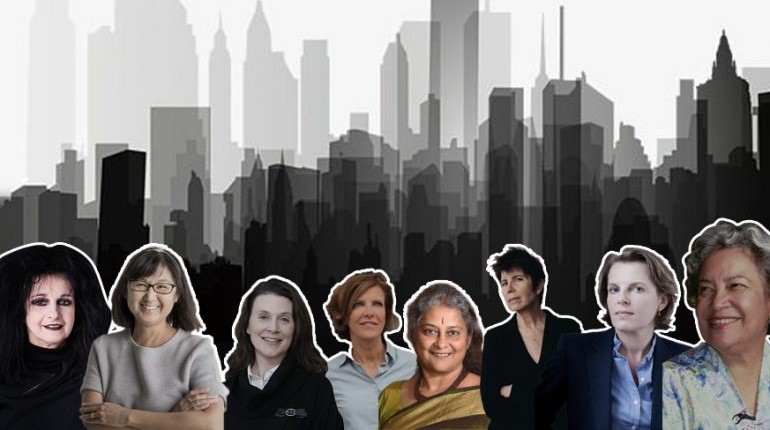
Since 1995, presidents have issued a series of annual proclamations designating the month of March as “Women’s History Month.” What positive impact have women architects had on the built environment?
Women architects have made significant contributions to the built environment, which have positively impacted society. Here are some examples:
Designing Spaces for People of All Genders: Women architects have worked towards designing spaces that are inclusive and accessible for people of all genders. They have considered the diverse needs and experiences of people and created safe, comfortable, and welcoming spaces.
Maya Lin, for example, is an American architect and artist best known for designing the Vietnam Veterans Memorial in Washington, D.C. She was only 21 years old when she won the design competition for the memorial, and her simple yet powerful design has become one of the most iconic works of architecture in the United States. Lin has also designed numerous other works, including the Civil Rights Memorial in Montgomery, Alabama.
Sustainable and Environmentally Friendly Designs: Women architects have been at the forefront of designing environmentally sustainable buildings. They have incorporated innovative technologies and designs that minimize the impact of buildings on the environment while ensuring that they are energy-efficient.
Promoting Community Development: Women architects have been essential in promoting community development. They have designed spaces encouraging social interaction and collaboration, such as community centers, public parks, and public art installations. These spaces have fostered a sense of community and belonging, which is essential for the well-being of individuals and society.
American architect Elizabeth Diller is known for her experimental and boundary-pushing designs. She is a founding partner of Diller Scofidio + Renfro, a New York-based architecture firm that has designed many notable projects, including the High Line, an elevated park built on an abandoned railway line in Manhattan. Diller has also created the Broad Museum in Los Angeles and the Museum of Image & Sound in Rio de Janeiro.
Promoting Diversity in Architecture: Women architects have promoted diversity and inclusivity. They have challenged the profession’s dominant cultural norms and biases and created spaces that celebrate the diversity of human experiences and cultures.
Overall, women architects have made significant contributions to the built environment, which have positively impacted society. Their designs have been innovative, inclusive, sustainable, and socially responsible, and they have helped shape our communities’ physical and cultural landscapes.
Zaha Hadid and Kazuyo Sejima come to mind. Zaha Hadid was an Iraqi-British architect known for innovative and futuristic designs. She was the first woman to receive the Pritzker Architecture Prize, the most prestigious architectural award. Her notable works include the Heydar Aliyev Center in Azerbaijan, the Guangzhou Opera House in China, and the MAXXI Museum in Rome.
Kazuyo Sejima is a Japanese architect known for her minimalist and ethereal designs. She is a founding partner of SANAA, an architecture firm that has designed many notable projects, including the Rolex Learning Center in Switzerland, the New Museum in New York, and the Louvre-Lens Museum in France. Sejima was the second woman to receive the Pritzker Architecture Prize after Zaha Hadid.
Many women architects make a significant contribution to the field of architecture, and these examples are but a few.
In the comment sections please list your favorite women in architecture!

Female Architects by the Number
Winner of the Emerging Woman Architect of the Year Award 2014, Julia King talks about her work in both the UK and India
While women have forged a path in many male-dominated industries today, challenges still face female architects. As women are slowly moving into relevant positions and even leadership roles, there is still plenty of work to be done. Fortunately, awareness of inequality has been the first step in the creation of organizations and movements to support women passionate about the field. In addition, some outspoken architects are bringing the issue into focus, increasing awareness and encouraging women interested in studying architecture to pursue the profession as a legitimate career path.
While statistics offer hope that the presence of female architects are on the rise, the numbers also show there is more work to be done. According to a 2018 report in Artsy, women comprise approximately half of the students in architecture schools today. However, the numbers begin to decline dramatically as students move to the professional world, with women making up only 18% of licensed architects. Even more concerning is the fact that just three of the top 100 architecture firms are led by women.
When considering global numbers, the statistics start to
lean more in the favor of women in the industry. The National Council of Architectural
Registration Boards (NCARB) estimated in 2016 that women made up more than
one-third (36%) of all newly licensed architects. That number marks a small
increase from 2015, when 34% of new licenses went to women.
Issues Facing Women in the Industry
One of the biggest concerns female architects have today is inequality
when it comes to salary. A 2017 article in the journal Archipreneur
found that men earning $100,000 or more outpace women earning the same amount
by 7%. The difference exists even though more women than men have a four-year degree.
At the lower end of the salary scale, nearly twice as many women as men earn
less than $50,000.
The issues relating to salary inequalities was summed up in
part by a 2018 article in the New
York Times, titled, “Where are all the Female Architects?” The report noted
that pipeline is not a problem as it is in other industries, since plenty of
women are going to school to train for the profession. Instead, a generalized
negative perception of women in the profession could be at the root of the
difference. The New York Times reports that as recently as 2018, there were
assumptions that women would quit if they got married or had children, or that
they would not be able to lead with authority on job sites. Even their
creativity has been questioned at times in this male-dominated industry.
Growing Support Network
Fortunately, more women are becoming known in the industry
today, paving the way for other female architects to join the ranks. The New
York Times also reports that more women are getting appointed as deans or
directors at architecture programs at prestigious schools like Cornell,
Columbia, Princeton, and Yale. Female architects at the top of companies are
also gaining more recognition as trade journals and mainstream media are
highlighting these women.
Industry organizations are also beginning to make a place
for women – through conferences geared specifically to female architects or committees
designed to bring women in the profession together. The American
Institute of Architects (AIA) is hosting its first Women’s Leadership
Summit in September of this year, in an effort to bring together female
architects and those that have achieved leadership roles within their
organizations.
According to the AIA website, the goals of the Women’s
Leadership Summit are:
- Increase awareness of women in the industry
- Create a learning environment by combining women
at various stages of their careers
- Help women discover paths to leadership roles
- Provide the opportunity for women to learn from
one another
In addition, the AIA New York features a Women in
Architecture Committee to develop and promote women in the industry through
monthly meetings and other events. The local committee focuses on licensure,
mentorship and networking opportunities to help women take their careers in
architecture to the next level.
Pioneers Taking the “Female” Out of the Position
As more women take the stage in the architectural industry,
women following in their footsteps can find both inspiration and knowledge to
succeed in their careers. Dorte Mandrup, a Danish architect who is also the
creative director and founder at Dorte Mandrup, published an article in 2017,
which appeared in Politiken and Dezeen.
In the article, Mandrup makes the point that she does not
want to be referred to as a “female architect.” Instead, she wants to be known
as an architect – one whose work can compare with the creativity of any male
without having the additional label attached. She believes that until women
stop getting referred to as “female architects,” true equality within the
industry cannot happen.
Liz Ogbu trained as an architect at the Harvard Graduate
School of Design. However, she referred to herself in the New York Times
article as a “designer, social innovator, and urbanist.” Her point was that
women can make a name for themselves in the world of architecture to redefine success
within the industry. Instead of focusing solely on skyscrapers and museums, Ogbu
is focusing on designs for the underprivileged such as shelters for immigrant
day workers.
“In many ways, architecture is a profession that has been the
epitome of the dominant white patriarchy, from most of the celebrated
starchitects to the all too frequent obsession with buildings that are better
known for their beauty of the object rather than the quality of the life that
they enable…I’ve been committed to a design practice that is rooted in
elevating the stories of those who have most often been neglected or silenced.”
Whether you are looking for your very first position in the industry or
ready to take your career to the next level, we can help. We help architects,
interior designers and others in the building design profession find the job of
their dreams. Contact CFA
today to learn more.
Women in Architecture
|
aia awards, AIA Billing Index, aia firm survey, archipreneur, architecture, Architecture billings index, architecture careers, architecture programs, Compensation, cornell, David McFadden, deans, dorte mandrup, equal pay, femail architects, google blogs, harvard, ilookup, Job Search, julia king, leadership roles, learning environment, liz ogbu, maledominatedindustry, meninarchitecture, metorship, princeton, promote women, salary ineqquality, starchatect, trade jourmals, winneremergingwomanarchitect, women, women in architecture, Women in Architecture Committee, Women's Month, womensleadershipsummit, yale
|









